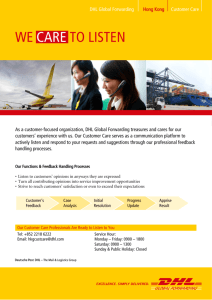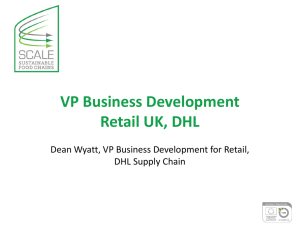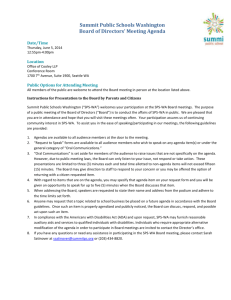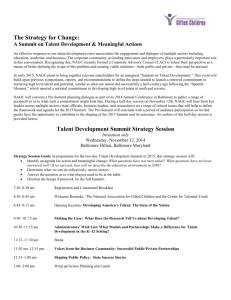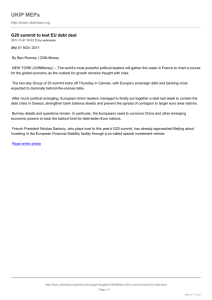PPT Recap - OC Tanner
advertisement
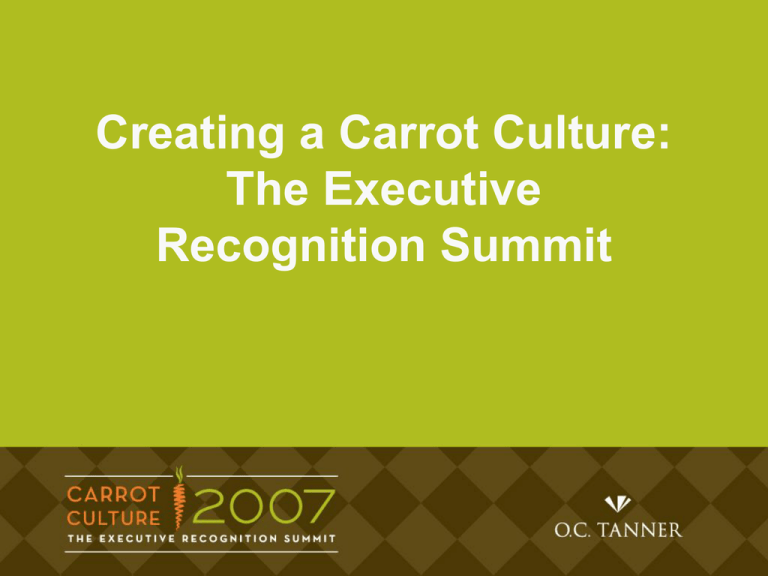
Creating a Carrot Culture: The Executive Recognition Summit Nancy Koury King Chief Operating Officer OPRS 10 Reasons Recognition Matters at OPRS Top Predictors to “I am satisfied with my job.” I often leave work feeling good. At work my opinions count. In my job I have the opportunity to do what I do best every day. Management cares for employees. My organization recognizes excellence. My performance is evaluated in a manner that makes me feel positive about working here. .64** .58** .58** .58** .57** .57** Top Predictors to “I am satisfied with my job.” I have the opportunity to learn and grow at work. .56** My supervisor cares for me as a person. .55** My supervisor recognizes excellence. .55** My supervisor does a good job of recognizing my contributions. .54** I am given recognition for my job performance. .54** Employee Satisfaction and Health Department Surveys 30 26.6 25 20 18.3 High Employee Satisfaction Low Employee Satisfaction 15 10 5 0 Scope and Severity Points--ODH “This data screams to our nurse managers,” says King. “There is an overwhelming preponderance of evidence that the recognition initiative works. It results in overall better patient care, happier nurses, fewer headaches for our managers and on and on. It’s a win for everyone.” Employee Recognition and Nursing Turnover 70 62 60 50 40 39 30 20 10 0 Nursing Turnover Organization Recognizes Excellence High Organization Recognizes Excellence Low Panel Discussion Michele Cox, Quest Diagnostic Joan Kelly, DHL Amanda Merriman, McLane Kal Mistry, VITAS Innovative Hospice Care “We made the switch from cash awards to gifts and instituted training. We started with just one hour of recognition training for our managers, but they wanted more, so we’re working on that. Recognition has really begun to integrate into our culture—engagement is increasing by the minute.” Michele Cox, Quest Diagnostics “Managers are the most important person in an employee’s life. We train our managers to know they make the difference. DHL looked at what’s driving business results and what’s important to the organization. Those are the things we reinforce all the way through our recognition initiatives—no matter where they are.” Joan Kelly, DHL “More often than not there’s no one to say good job when you’re sweating your butt off in Phoenix! That’s why focused, strategic recognition is so critical for maintaining the quality of our workforce. We offer recognition for everything we hope to motivate— performance, loyalty and even wellness. Our biggest focus is training—train, train, train!” Amanda Merriman, McLane “We can always improve our recognition efforts. The key is to not become complacent. Recognition helps us promote our brand internally, where it matters and where it translates into better services for our patients. People may have the skills to do a great job, but we have discovered that without praise they are not fully engaged.” Kal Mistry, VITAS Innovative Hospice Care SHRM HR Business Leader of the Year Bruce Pfau Vice Chair Human Resources KPMG Inadequate Capacity War for Talent KPMG’s Unique Issues Sarbanes-Oxley 404 Less-thanPositive Press Legal/ Regulatory Complexities and Liability Where We Are 2 Years Later Overall headcount is up 9% from last year and almost 12% over last two years Annualized turnover is down over 5 percentage points and at historical lows Experienced hires are 20% ahead of last year and well ahead of plan Firmwide offer-to-acceptance ratio is at 85% Firmwide, 39% of experienced hires come through employee referrals Made nearly 300 new partners and over 60 Direct Entry Partners Where We Are 2 Years Later “Overall, I would say KPMG is a great place to work” Percent Favorable 80% 75% 76% 2005 2006 62% 60% 53% 40% 2003 2004 How Did We Get There – Summer 2005 Leveraged positive morale momentum Multiple methods in place to listen to our people HR at the table Well planned and executed communications plan Outreach to clients Partner commitment and sacrifice Laser-focused leadership team Followed through on all commitments to employees “Those locations that use the Encore program more often have an average turnover rate two points lower than low-use locations. When you consider that each point of turnover means $1015 million to the bottom line, it makes the $7 million we’re spending on recognition the least expensive thing we can do to keep employees.” Bruce Pfau, KPMG 100 Best Places for Latinos to Work Honor Roll Best Places to Work Vision Award Top 10 Companies for People with Disabilities 25 Noteworthy Companies David Ulrich Best-selling Author The HR Value Proposition Context: What’s happening in business that is changing the game Technology Connectivity: always connected Accessibility: no boundaries Ambiguity: uncertain future Industry/economic trends Transparency: open book management Adaptability: the need to change Intensity: market conditions Convergency: overlap of industries Demographics Mobility: movement of talent globally Diversity: globalization of work force Spirituality: a need for trust and values G L O B A L I Z A T I O N Talent Formula: Competence * Commitment * Contribution contribution talent competence commitment Why worry about leadership brand? Company P/E ratio of company for the past 10 years P/E ratio of industry (not counting the firm) for the past 10 years Market Capital (in Billions) GE 27.58 12.88 363.61 J&J 26.02 24.42 174.40 Teva 33.25 23.39 28.75 Pepsi 28.75 21.12 7.23 Boeing 23.82 15.83 70.17 Disney 27.15 19.57 70.53 P&G 27.0 21.2 199.29 Lexus (Toyota) 10.40 9.89 231.33 Nordstom 22.98 19.23 13.63 Recognition implications: Have we linked our recognition to the right standards? • Talent: individual performance • Organization: culture from the outside/in • Leadership brand: connecting customers to employees? “We have to pay attention and make sure people are being recognized first and that they are being recognized for the right stuff.” David Ulrich Chester Elton Senior Vice President The Carrot Culture Group One of largest workplace surveys ever conducted: • Focus groups • Interviews It is statistically impossible to be a trusted, communicating, team-building, goal-setting manager unless you use praise and recognition. Onboarding: The process to develop dedicated, productive and engaged new employees, who are more likely to stay and stay committed. Champions Celebrate! Best in Class Celebrate! Carrot Culture™ Award Presented by: Dave Petersen President, O.C. Tanner Carrot Culture™ Award 2007: DHL Joan Kelly accepts The Carrot Culture Award for DHL Why Attend? “I appreciate that The Recognition Summit was what it was billed to be—a high level forum for sharing ideas and getting the practice of recognition right in our organizations. Personally, I have so many events to choose from, that it is critically important that I make the most of the events I choose to attend…The Summit provided me with key takeaways.” Jeff Shuman Vice President Human Resources and Corporate Relations Recipient 2007 Stevie® for Best Human Resources Executive, American Business Awards Harris Corporation Why Attend? “The Summit is just phenomenal. We have decided to stay an extra day and do a debriefing on what we’ve learned. We had some ideas before we came, but now we know how we need to go about getting the recognition results we’re after.” “The sessions have been top notch. I now know how to go back and sell recognition to our CEO and other members of our leadership team and to help them understand recognition’s value to the organization.” Camille Chatman, OfficeMax Why Attend? “The Summit has been exceptional. I believe that recognition is a key lever of business. I come to the Summit to actively network and participate. I believe in the concepts being presented here and plan to implement many new ideas.” Larry Callahan, Vice President HR, Norton Healthcare “We are at the beginning stages of forming a reward program and came to The Summit to better understand non-monetary rewards. My aha’s have come from the myriad of little things that companies are doing at little or no cost that have an impact on employees.” Rima Dagia, Marsh USA Inc.
